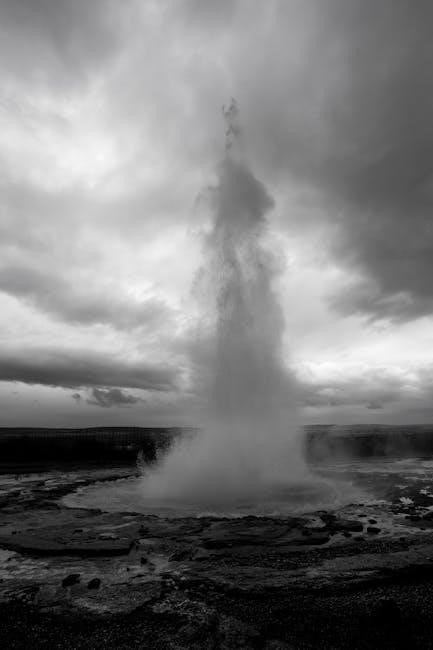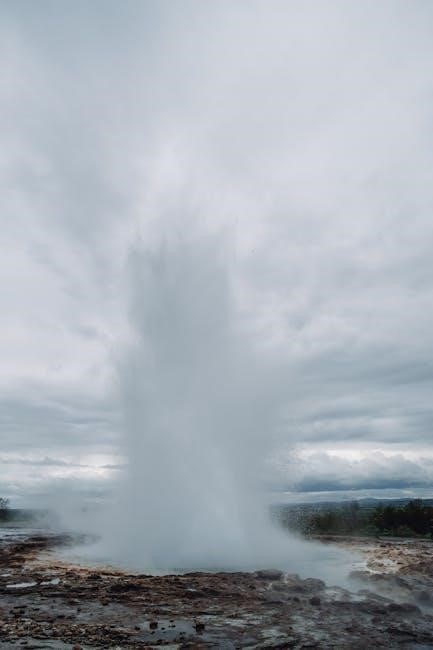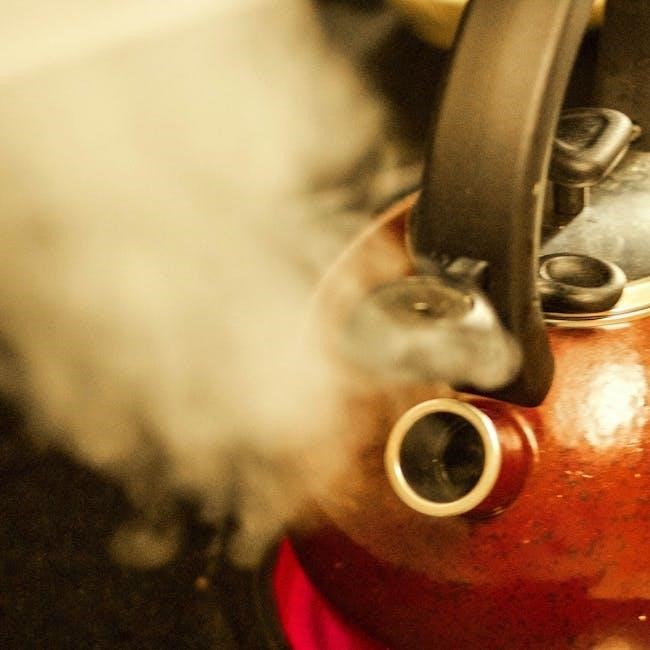Energy-efficient water heaters are crucial for reducing energy consumption and lowering utility bills; They provide hot water while minimizing environmental impact․ Energy Star certification ensures models meet high efficiency standards, helping homeowners save money and reduce their carbon footprint․
1․1 Importance of Energy Efficiency in Water Heaters
Energy efficiency in water heaters is crucial for reducing energy consumption and lowering utility bills․ Water heaters are among the largest energy-consuming appliances in households, accounting for approximately 12-18% of total energy use․ By choosing an energy-efficient model, homeowners can significantly reduce their energy costs and environmental impact․ Energy Star-certified water heaters, for instance, use advanced technologies to minimize energy waste, providing long-term savings․ Additionally, energy-efficient models often qualify for rebates and incentives, further offsetting initial costs․ As global concerns about climate change grow, adopting energy-efficient water heaters becomes a practical and eco-friendly choice, helping to reduce carbon footprints while maintaining reliable hot water supply․ This makes energy efficiency a cornerstone of modern water heating solutions․
1․2 Brief Overview of Energy Guide Ratings
The Energy Guide rating system helps consumers understand the energy efficiency and operating costs of water heaters․ This label, mandated by the U․S․ Department of Energy, provides key information, including estimated annual energy consumption and operating costs․ It allows homeowners to compare different models and make informed decisions․ The rating system highlights metrics like Uniform Energy Factor (UEF) and Energy Factor (EF), which measure efficiency based on heat output and energy input․ Higher ratings indicate better efficiency and lower energy use․ Additionally, the label specifies whether the product meets Energy Star certification standards, which require models to exceed federal energy efficiency requirements․ By focusing on these ratings, consumers can identify water heaters that balance performance, cost, and environmental impact, ensuring a smarter and more sustainable choice for their hot water needs․

Understanding Energy Efficiency Ratings
Energy efficiency ratings, including Energy Star certification and UEF, help consumers evaluate water heater performance, reducing energy consumption and lowering utility bills significantly over time․
2․1 What Are Energy Star Certifications?
Energy Star certifications are labels awarded to products that meet energy efficiency standards set by the U․S․ Environmental Protection Agency (EPA)․ For water heaters, this certification indicates that the model uses significantly less energy than standard products while maintaining performance․ Energy Star certified water heaters must undergo rigorous testing to prove they meet specific efficiency criteria․ These certifications help consumers identify energy-efficient options, reducing both utility bills and environmental impact․ By choosing an Energy Star certified water heater, homeowners can save approximately $600 annually on energy costs, depending on usage and household size․ This certification is a trusted mark of quality and sustainability, guiding consumers toward eco-friendly and cost-effective solutions for their hot water needs;

2․2 Uniform Energy Factor (UEF) Ratings Explained
The Uniform Energy Factor (UEF) is a standardized measure of a water heater’s efficiency, accounting for all energy losses, including standby losses․ It represents the ratio of hot water delivered to the energy consumed over a 24-hour period․ A higher UEF indicates greater efficiency․ For example, heat pump water heaters typically have UEF ratings between 3․0 and 4․0, while conventional models may range from 0․5 to 0․9․ UEF is calculated based on the amount of hot water delivered, energy consumption, and standby losses․ This metric helps consumers compare different models and identify the most energy-efficient options․ By selecting a water heater with a higher UEF, homeowners can reduce energy consumption and lower their utility bills while minimizing environmental impact․ UEF ratings are also closely tied to Energy Star certifications, as products meeting Energy Star standards often have higher UEF values․
2․3 Understanding Energy Factor (EF) and Its Impact
The Energy Factor (EF) measures a water heater’s efficiency by comparing the energy delivered to the energy consumed․ It ranges from 0․0 to 2․0, with higher values indicating greater efficiency․ EF considers factors like recovery efficiency, standby losses, and cycling losses․ For example, electric water heaters typically have lower EF ratings (0․7-0․95), while gas models may range from 0․5 to 0․7․ Heat pump water heaters often achieve higher EF ratings (2․0 or above), making them highly efficient․ A higher EF reduces energy consumption and lowers utility bills․ Homeowners should prioritize models with higher EF ratings, especially those certified by Energy Star, as they meet strict efficiency standards․ By choosing a water heater with a high EF, households can significantly cut energy costs and reduce their environmental footprint over time․ This metric is crucial for making informed, cost-effective decisions when selecting a water heater․

Types of Energy-Efficient Water Heaters
Energy-efficient water heaters include electric, gas, heat pump, solar, tankless, and hybrid models, each offering unique benefits in terms of energy savings and environmental impact․
3․1 Electric Water Heaters
Electric water heaters are a popular choice for their simplicity and lower upfront costs․ They operate by using electric resistance elements to heat water, making them easy to install and maintain․ While they are generally more affordable to purchase, they can be more expensive to operate compared to gas or heat pump models․ However, advancements in technology have led to more efficient electric water heaters, with some models earning the Energy Star certification․ These certified models use innovative features like heat pumps or advanced insulation to reduce energy consumption․ Additionally, hybrid electric water heaters combine traditional electric elements with heat pump technology, offering higher efficiency and significant energy savings․ Overall, electric water heaters remain a reliable and versatile option for many households, especially in areas where natural gas is not available․
3․2 Gas Water Heaters
Gas water heaters are known for their high efficiency and rapid hot water delivery, making them a preferred choice for many households․ They operate by burning natural gas or propane to heat water, providing consistent and reliable performance․ Compared to electric models, gas water heaters generally have lower operating costs and faster recovery times․ Energy Star-certified gas water heaters are available, offering even higher efficiency and reduced energy consumption․ These models often feature advanced technologies like condensing design or modulating burners, which enhance performance and energy savings․ Additionally, gas tankless water heaters are gaining popularity for their ability to provide continuous hot water while maintaining high efficiency․ Overall, gas water heaters are a strong option for homeowners seeking a balance of performance, efficiency, and cost-effectiveness․
3․3 Heat Pump Water Heaters

Heat pump water heaters are among the most energy-efficient options available today․ They work by transferring heat from the surrounding air to the water, rather than generating heat directly․ This process makes them highly efficient, with some models operating at 300-400% efficiency․ Energy Star-certified heat pump water heaters are particularly recommended, as they meet strict energy efficiency standards․ These systems are ideal for temperate climates and can save homeowners significant amounts on their energy bills—up to $600 annually for a typical family․ While their upfront cost is higher, the long-term savings and environmental benefits make them a worthwhile investment․ Heat pump water heaters also offer the flexibility to operate in various modes, optimizing energy use and comfort․ Their eco-friendly design aligns with sustainability goals, making them a popular choice for environmentally conscious homeowners․
3․4 Solar Water Heaters
Solar water heaters are an eco-friendly and cost-effective option for providing hot water․ They use solar panels to capture sunlight, which is then used to heat water, significantly reducing energy consumption․ These systems can be either active (using pumps) or passive (relying on natural water circulation)․ Solar water heaters are highly efficient in sunny climates and can save homeowners up to 50-80% on water heating costs․ While the initial investment is higher, they offer long-term savings and qualify for rebates and incentives․ However, their performance depends on sunlight availability, making them less suitable for cloudy or high-latitude regions․ Many solar water heaters carry high Energy Star ratings, ensuring they meet rigorous efficiency standards․ Combining solar systems with traditional heaters can optimize performance and reliability, making them a sustainable choice for environmentally conscious households․

3․5 Tankless Water Heaters
Tankless water heaters, also known as on-demand water heaters, provide hot water only when needed, eliminating the need for a storage tank․ This design reduces energy consumption by avoiding standby heat loss, making them highly efficient․ They are compact, saving valuable space, and can be powered by gas or electricity․ Tankless models often have higher upfront costs but offer long-term savings through lower energy bills․ They are ideal for households with consistent hot water demand but may struggle during peak usage․ Some tankless heaters are Energy Star certified, ensuring they meet efficiency standards․ Maintenance is generally easier due to the absence of a tank, reducing risks of leaks or corrosion․ However, initial installation can be complex and may require professional assistance․ Overall, tankless water heaters are a modern, efficient solution for many homes․
3․6 Hybrid Water Heaters
Hybrid water heaters combine different heating technologies, such as heat pumps and conventional electric elements, to optimize efficiency and performance․ These systems are designed to adapt to varying hot water demands, automatically switching between modes to minimize energy use․ By leveraging heat pump technology, hybrid heaters can achieve high efficiency, often exceeding that of traditional models․ They typically have high Uniform Energy Factor (UEF) ratings, ranging from 3 to 4, indicating superior performance․ Hybrid models are known for their ability to reduce energy consumption by up to 400% compared to standard electric water heaters, saving homeowners significant amounts on utility bills․ While they may have higher upfront costs, their long-term savings and environmental benefits make them a compelling choice․ Many hybrid water heaters are Energy Star certified, ensuring they meet stringent efficiency standards․ Additionally, they often come with advanced features like programmable controls and smart diagnostics, enhancing their convenience and efficiency․ These systems are ideal for homeowners seeking a balance between energy savings and reliable performance․ Hybrid water heaters are also eligible for rebates and incentives, further offsetting their initial investment․ Overall, they represent a smart, eco-friendly option for modern homes․

Factors to Consider When Choosing a Water Heater
When selecting a water heater, consider household size, hot water demand, usage patterns, budget, installation requirements, and space constraints to ensure optimal performance and energy efficiency․
4․1 Household Size and Hot Water Demand
Household size and hot water demand are critical factors in selecting an energy-efficient water heater․ A larger family typically requires more hot water, necessitating a higher-capacity system․ Understanding peak usage patterns helps determine the right size to avoid insufficient supply or excess energy consumption․ For instance, a family of four may need a different capacity compared to a single person․ Assessing daily routines, such as simultaneous showers or laundry, ensures the chosen heater meets demand without wasting energy․ Proper sizing balances performance and efficiency, preventing high energy bills and ensuring consistent hot water availability․ This step is essential for optimizing both comfort and cost-effectiveness in any home․
4․2 Water Usage Patterns and Peak Demand
Understanding water usage patterns and peak demand is essential for selecting the right energy-efficient water heater․ Families with multiple members often experience higher hot water demand, especially during mornings and evenings․ Activities like showers, laundry, and dishwashing contribute to peak usage․ Analyzing these patterns helps identify the required capacity to meet needs without excess energy consumption․ For instance, simultaneous showers or running multiple appliances can strain a smaller system․ Conversely, oversized systems may waste energy․ Assessing daily routines and major water-using appliances ensures the heater is appropriately sized․ This alignment prevents energy inefficiency and ensures consistent hot water supply․ Properly matching the heater to usage patterns optimizes performance, reducing both energy bills and environmental impact while maintaining comfort․ Accurate sizing is key to balancing demand and efficiency effectively․
4․3 Budget and Cost Considerations
Budget and cost considerations are critical when selecting an energy-efficient water heater․ High-efficiency models, such as heat pump or solar water heaters, often have higher upfront costs but offer significant long-term energy savings․ Energy Star-certified products may qualify for rebates or tax incentives, reducing initial expenses․ Homeowners should evaluate both purchase price and operational costs, as some systems, like electric storage heaters, are affordable to buy but costly to run․ Conversely, gas or tankless heaters might offer lower operating expenses despite higher installation fees․ Assessing your budget and long-term savings potential ensures a cost-effective decision․ Consider financing options or incentives to offset initial investments in energy-efficient systems, balancing immediate costs with future savings and environmental benefits․ Properly aligning your budget with system efficiency ensures a practical and economical choice for your home’s needs․
4․4 Installation Requirements and Space Constraints
Installation requirements and space constraints are essential factors to consider when choosing an energy-efficient water heater․ Different systems have varying needs, such as heat pump water heaters requiring adequate space for proper airflow, while solar water heaters need suitable roof placement for optimal sun exposure․ Tankless water heaters can be wall-mounted, saving floor space, but may require additional plumbing or electrical connections․ Hybrid systems often need more room due to their dual functionality․ Gas water heaters must be installed with proper ventilation to ensure safety and efficiency․ Electric models, while space-efficient, may require upgraded electrical circuits․ Homeowners should assess their available space and infrastructure to ensure compatibility with the chosen system․ Consulting a professional installer is crucial to navigate these requirements and ensure a smooth installation process, especially for complex systems like solar or heat pump models․ Proper installation maximizes efficiency and safety, making it a critical step in the selection process․

Cost and Savings Analysis
Energy-efficient water heaters vary in upfront costs, but long-term savings through reduced energy bills often offset initial investments․ Rebates and tax credits further enhance financial benefits․
5․1 Upfront Costs of Energy-Efficient Models

Energy-efficient water heaters often come with higher upfront costs compared to traditional models․ Prices vary widely depending on the type and technology․ For instance, heat pump water heaters and solar water heaters are typically more expensive to purchase and install․ However, these advanced systems offer significant long-term energy savings․ Electric models with Energy Star certification may also have a higher initial price tag, but they provide improved efficiency․ Gas water heaters with high efficiency ratings can also be costly but are generally more affordable than heat pump or solar options․ While the initial investment may seem daunting, the long-term savings on energy bills and potential rebates can make energy-efficient models a financially viable choice for many homeowners․
5․2 Long-Term Energy Savings and Payback Period
Energy-efficient water heaters offer significant long-term energy savings, offsetting their higher upfront costs․ Heat pump water heaters, for example, can save homeowners approximately $600 annually due to their high efficiency․ Solar water heaters also provide substantial savings, especially in regions with ample sunlight․ The payback period for these systems varies but typically ranges between 5 to 10 years, depending on usage patterns and local energy prices․ Over their lifespan, energy-efficient models can reduce energy bills by hundreds of dollars, making them a cost-effective choice․ Additionally, these systems contribute to a reduced carbon footprint, aligning with environmental sustainability goals․ While the initial investment may seem substantial, the long-term financial and environmental benefits make energy-efficient water heaters a wise investment for many households․
5․3 Rebates, Incentives, and Tax Credits
Many governments and organizations offer rebates, incentives, and tax credits to encourage the adoption of energy-efficient water heaters․ For instance, ENERGY STAR-certified models often qualify for federal tax credits, which can significantly reduce the upfront cost․ Heat pump water heaters, in particular, may be eligible for a federal tax credit of up to $600․ Additionally, some states and utilities provide rebates for installing energy-efficient systems, further lowering the initial investment․ Solar water heaters also benefit from specific incentives, such as tax credits and rebates, due to their renewable energy benefits․ These programs vary by location, so homeowners should check local and national offerings to maximize their savings․ By combining these incentives with long-term energy savings, energy-efficient water heaters become an even more attractive and cost-effective choice for homeowners․ Always verify eligibility criteria for these programs to ensure compliance․

Maintenance and Efficiency Optimization
Regular maintenance, such as checking temperature settings and insulation, can significantly enhance water heater efficiency․ Proper upkeep reduces energy waste and ensures optimal performance, lowering overall costs․
6․1 Regular Maintenance Tips for Water Heaters
Regular maintenance is essential to ensure your water heater operates efficiently and lasts longer․ Start by checking the temperature and pressure relief valve to prevent excessive pressure buildup․ Inspect the anode rod annually to avoid corrosion, and replace it if necessary․ Additionally, flush the tank every six months to remove sediment, which can reduce efficiency and cause damage․ Ensure proper insulation of pipes and the heater to minimize heat loss․ Finally, review your energy consumption patterns and adjust settings to optimize energy use, such as lowering the temperature when away from home․ These simple steps can significantly improve your water heater’s performance and longevity, saving you money and reducing energy waste over time․
6․2 Optimizing Energy Use and Reducing Waste
Optimizing energy use and reducing waste are critical for maximizing the efficiency of your water heater․ Start by adjusting the temperature setting to 120°F, which is sufficient for most households and prevents excessive energy consumption․ Consider installing a timer to operate the heater only during peak usage hours․ For added efficiency, insulate exposed pipes and the water heater itself to reduce heat loss․ Energy Star-certified models often include advanced features like smart sensors and eco-mode settings, which optimize performance․ Additionally, heat pump water heaters are highly efficient, using ambient air to heat water and saving up to 600 annually․ Regularly monitoring your energy usage and adjusting settings can further reduce waste․ By combining these strategies, you can significantly lower your energy bills while minimizing your environmental impact․ Always look for models with high UEF ratings to ensure optimal energy performance․
Environmental Impact and Sustainability
Energy-efficient water heaters significantly reduce carbon footprints by lowering energy consumption․ Energy Star-certified models and heat pump water heaters lead the way in sustainable, eco-friendly solutions for hot water needs․
7․1 Reducing Carbon Footprint with Energy-Efficient Models
Energy-efficient water heaters play a pivotal role in reducing carbon footprints by minimizing energy consumption․ Models certified by Energy Star utilize advanced technologies to lower greenhouse gas emissions․ Heat pump water heaters, for instance, operate at 300-400% efficiency, significantly cutting energy use compared to traditional systems․ By adopting these eco-friendly options, homeowners can contribute to a sustainable future while reducing their environmental impact․ These models not only benefit the planet but also offer long-term cost savings, making them a practical choice for environmentally conscious consumers․
7․2 Eco-Friendly Options: Solar and Heat Pump Systems
Solar water heaters are among the most eco-friendly options, harnessing renewable energy from sunlight to heat water․ These systems use solar panels to absorb heat, which is then transferred to a storage tank․ This technology significantly reduces reliance on fossil fuels, lowering carbon emissions and energy bills․ Ideal for sunny climates, solar water heaters offer a sustainable solution for hot water needs․
Heat pump water heaters are another environmentally friendly choice, operating by transferring heat from the air or ground to water․ With high efficiency ratings (UEF 3-4), they use up to 400% less energy than traditional heaters․ These systems are particularly effective in warmer climates and can save homeowners around $600 annually․ Both solar and heat pump systems are gaining popularity due to their eco-friendly nature and long-term cost benefits, making them excellent choices for sustainable living․
Investing in an Energy Star certified water heater with a high UEF rating can significantly reduce energy costs and environmental impact, making it a wise choice for eco-conscious homeowners․
8․1 Summary of Key Considerations
When selecting an energy-efficient water heater, consider household size, hot water demand, and usage patterns to ensure adequate supply․ Budget and long-term savings are critical, with Energy Star certified models offering significant reductions in energy bills․ Hybrid and heat pump systems, though costlier upfront, provide exceptional efficiency, potentially cutting costs by $600 annually․ Solar and tankless options offer unique benefits, such as eco-friendliness or continuous hot water․ Assess installation requirements and space constraints to avoid logistical challenges․ Environmental impact and rebates further influence decisions, making energy-efficient choices both financially and ecologically beneficial․ Balancing these factors ensures a practical, cost-effective solution that meets your needs while minimizing energy waste and reducing your carbon footprint․
8․2 Final Tips for Choosing the Best Energy-Efficient Water Heater
When selecting the best energy-efficient water heater, prioritize your household’s specific needs and budget․ Consider Energy Star certification to ensure high efficiency and long-term savings․ Evaluate your hot water usage patterns and peak demand to choose the right size and type․ Compare upfront costs with potential long-term energy savings, especially for hybrid, solar, or heat pump models․ Check for rebates and incentives to offset initial expenses․ Research product reviews and ratings to assess reliability and performance․ Finally, consult a professional to ensure proper installation and sizing for optimal efficiency․ By balancing these factors, you can select a water heater that meets your needs while minimizing energy waste and reducing your environmental impact․